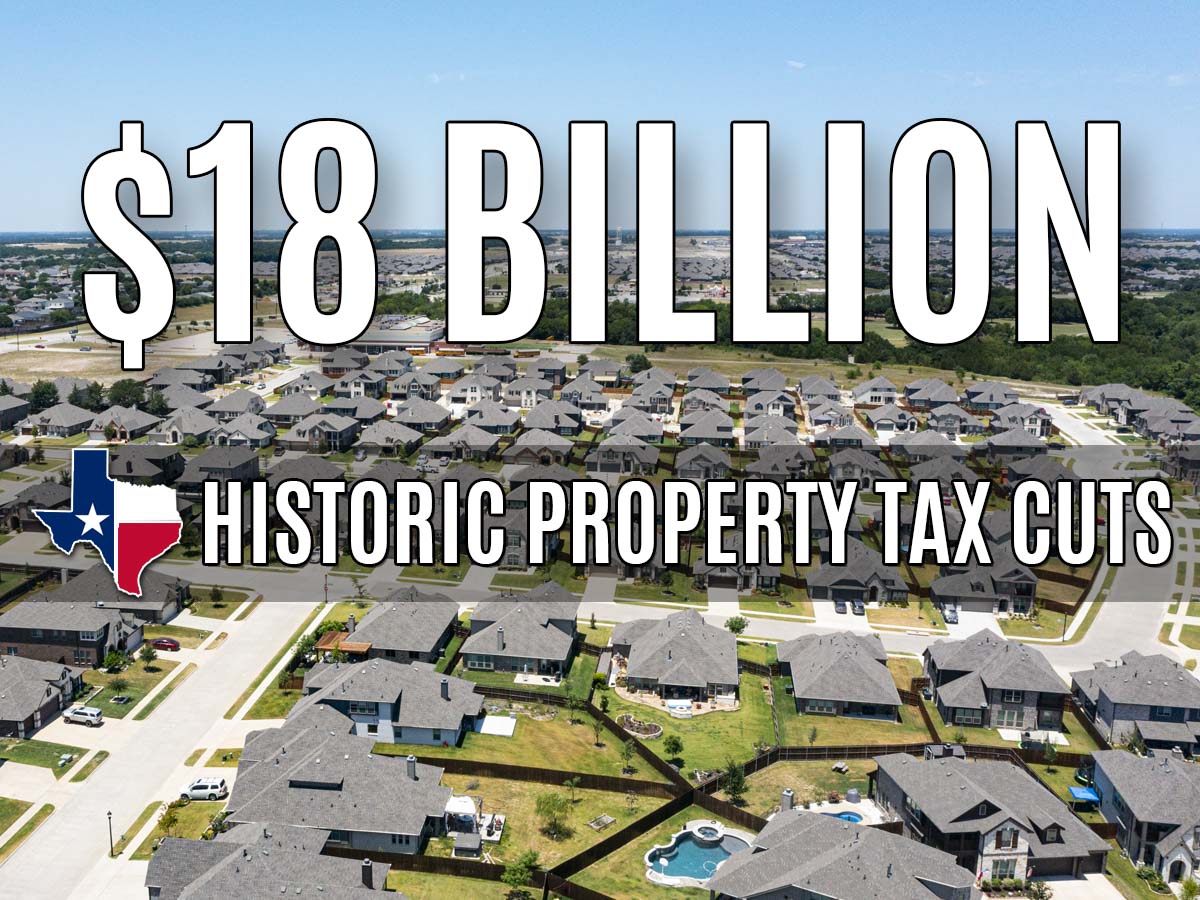It’s no secret that the Dallas-Fort Worth area has been experiencing remarkable growth and, with that, a surge of interest in the intricacies of property ownership.
If you’ve been keeping an ear to the ground, you’ve likely heard mention of PIDs and MUDs.
These two concepts are becoming increasingly significant in the Texas real estate landscape.
So what exactly do PIDs and MUDs mean for homebuyers and sellers in the Dallas area?
More importantly, how do they impact the decision-making process?
In order to fully grasp the ins and outs of these terms, it’s essential to understand their true function and implications.
From there, you’ll be better equipped to navigate the market and make confident, well-informed decisions – whether you’re buying your dream home, selling your current property, or simply exploring the endless possibilities that the Dallas-Fort Worth area has to offer. Let’s explore the world of PIDs and MUDs in Texas.
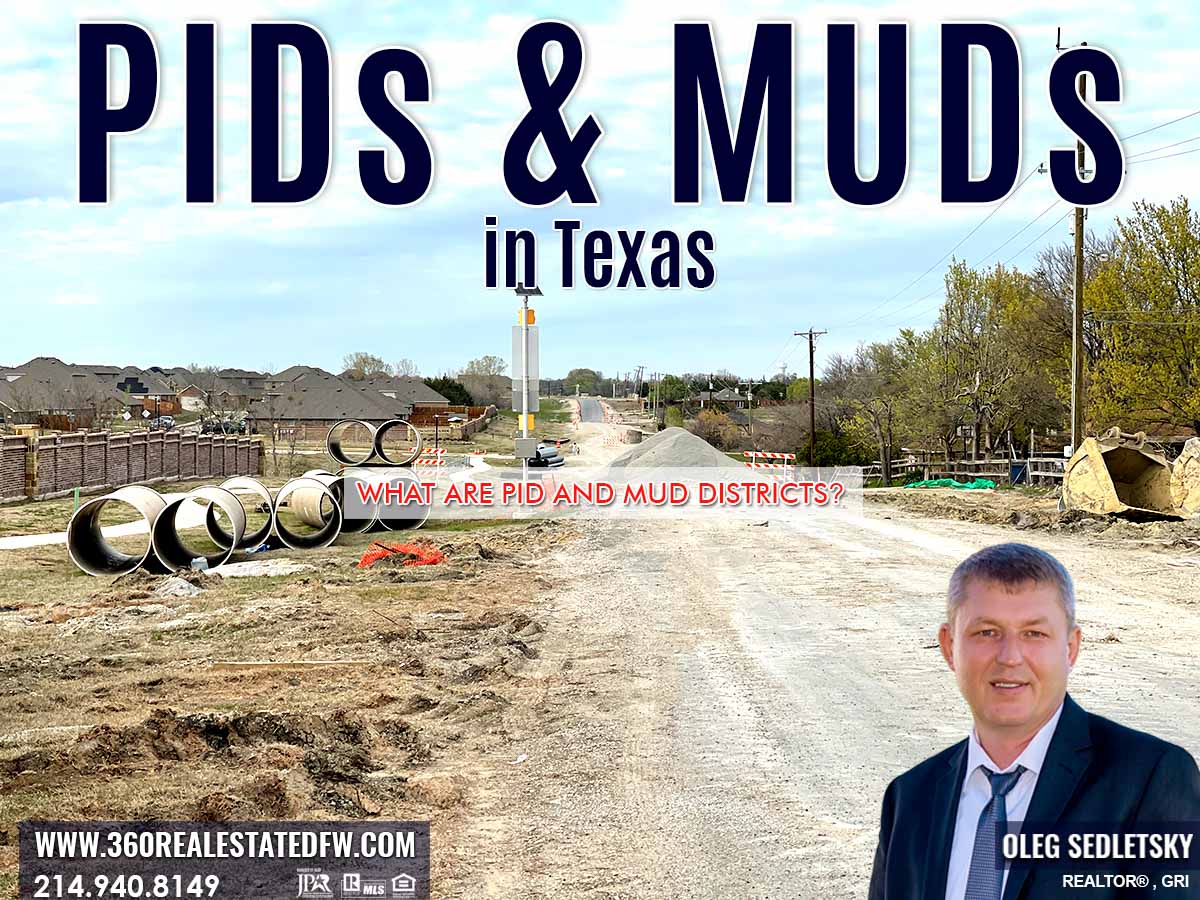
Let’s start with MUD,
MUD is an acronym that stands for Municipal Utility District.
But what exactly does that mean?
In essence, MUD is a special tax authorized by the Texas Commission of Environmental Quality (TCEQ) that aids in the creation, funding, or management of water districts in the Lone Star State.
Usually, MUD is created to help develop new communities in Texas that might need access to essential public services like water and sewage systems.
It’s important to recognize that this unique approach to funding utilities is governed by Chapter 49 of the Texas Water Code, with the Texas Commission of Environmental Quality playing a critical role in supervising and overseeing these water districts.
In doing so, communities receive essential support in building necessary infrastructure – and MUD becomes a lifesaver.
So, the next time you enjoy a cold glass of water or take a leisurely drive down a well-maintained road in Texas, spare a thought for the mighty MUD making it all possible!
For more information about the Texas Commission of Environmental Quality, visit the TCEQ website https://www.tceq.texas.gov/
How does the MUD work?
Imagine you’re a developer building a brand-new housing development, and you’re tasked with bringing essential utilities like water, sewer, roads, and communications to the area.
However, all these additions come with a hefty price tag, and naturally, you’d want to be reimbursed for the expenses of making these vital improvements.
You have two options to achieve this: either by charging more for the lots upfront, meaning the property buyers cover the expense immediately or by allowing landowners to repay the infrastructure expenses over time.
This is where the real-life example of MUD, or Municipal Utility District, comes into play. Once a MUD is established, property owners in the area pay a special tax that goes towards repaying the cost of the development.
The MUD enables property owners within the development to cover the costs of infrastructural advancements through ongoing tax payments, which ultimately go toward repaying the developer’s initial investments.
So, it truly is a win-win for both parties, with homeowners enjoying a thriving community and developers reaping the rewards of their efforts.
How does MUD affect homebuyers?
The impact of MUD on homebuyers can be quite significant, especially when it comes to property affordability.
Just imagine if developers had to foot the entire bill for all those necessary infrastructure costs – we’d be looking at some seriously astronomical lots and home prices! Thanks to MUD, however, these expenses are spread out, making it considerably more feasible for potential buyers to achieve their dreams of homeownership.
However, while the amenities and community feel might sweep you off your feet, it’s vital not to overlook the financial impact of buying a home in MUD will have on your long-term budget. Remember, securing your dream home might come with extra taxes and fees unique to these developments. It’s always a smart move to consult with your trusted realtor and lender to help assess how these additional financial obligations may influence your overall home ownership experience. After all, keeping an eye on the numbers will help ensure that your foray into MUD living remains something to celebrate for years to come.
So, while MUD might sound like a muddy situation, it actually plays a vital role in keeping property prices within reach for many aspiring homeowners.
Unlock Exceptional Service!
Assistance with all your real estate needs in the Dallas-Fort Worth area is just a click or call away. Reach out at 214-940-8149 or connect through the links below.
Let’s look at the PID.
PID is an acronym that stands for Public Improvement District.
The Public Improvement District, or PID, is a versatile tool used by cities in Texas for the development of essential utilities and public spaces. Thanks to Chapters 372 and 382 of the Texas Local Government Code, PIDs go beyond the capabilities of Municipal Utility Districts (MUDs) by financing a variety of infrastructure, including park areas, open spaces, lakes, fountains, entryways, recreational amenities, and pedestrian-friendly features. Furthermore, PIDs can cater to additional services that communities require. A standout feature of PIDs is their assessment method; unlike MUDs, which base their tax rates on property values, PIDs fix assessments upon payment of each property. This means that no further assessments will be charged on the same property, regardless of whether the payments are made over time or paid in full ahead of schedule. In simple terms, PID is a special assessment. So next time you stroll through a beautifully landscaped park or enjoy the sight of an artistic water feature in Texas, you might have a PID to thank for it!
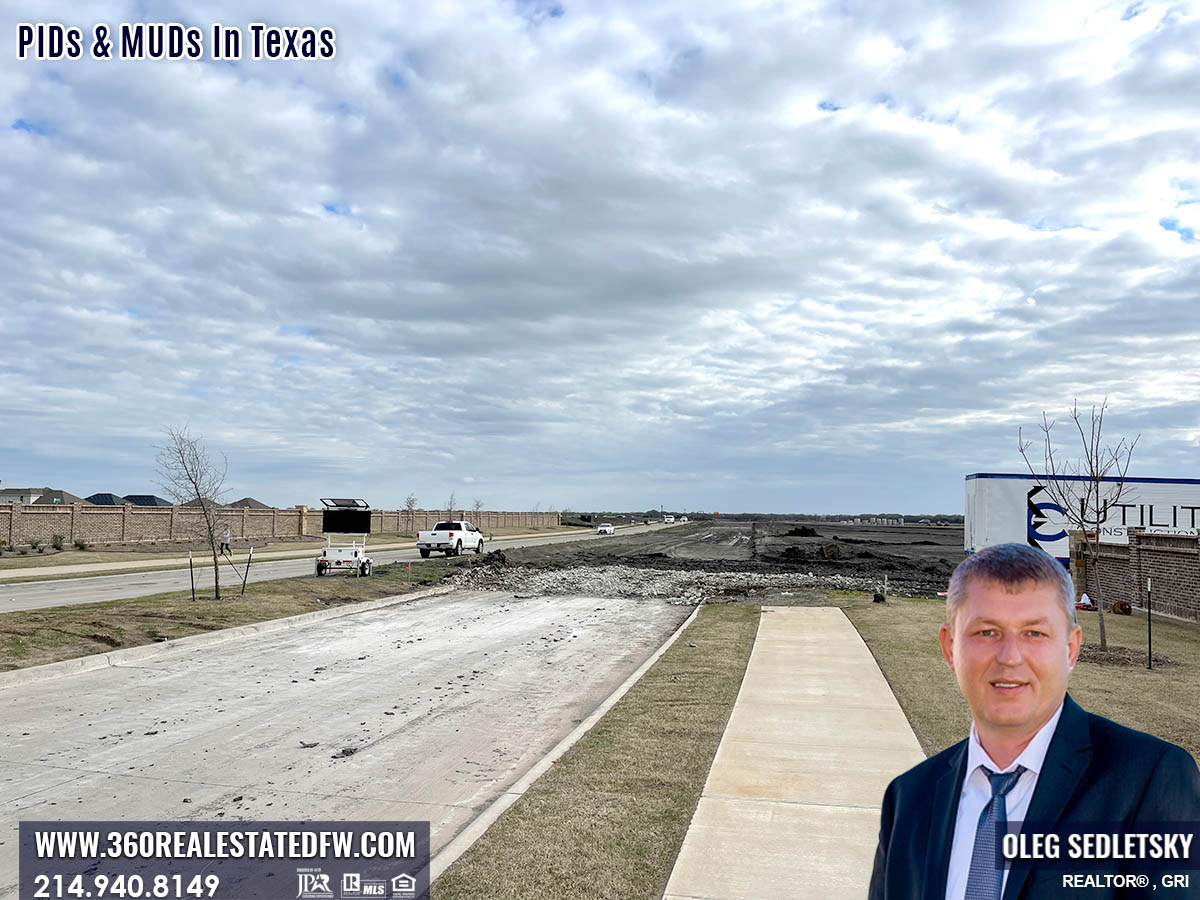
The road that is being built in PID in Princeton Texas
How does the PID work?
Imagine a neighborhood where property owners decide they want to elevate their area’s overall quality by opting for additional services provided by the city. These can include various enhancements, such as promotional events or increasing the frequency of street cleaning. In some cases, it might even encompass additional police protection for that extra sense of security. To make this happen, these property owners come together and form a Public Improvement District (PID) by petitioning the city, detailing their desired services. Once the city gives the green light, an additional assessment is levied on the property owners within the specified district to fund these enhancements. A brilliant illustration of this concept is in Dallas, where some PIDs offer round-the-clock police protection, ensuring a policeman is present 24/7 onsite. The property owners in these districts happily bear the additional expenses, knowing their neighborhood reaps the benefits of such services.
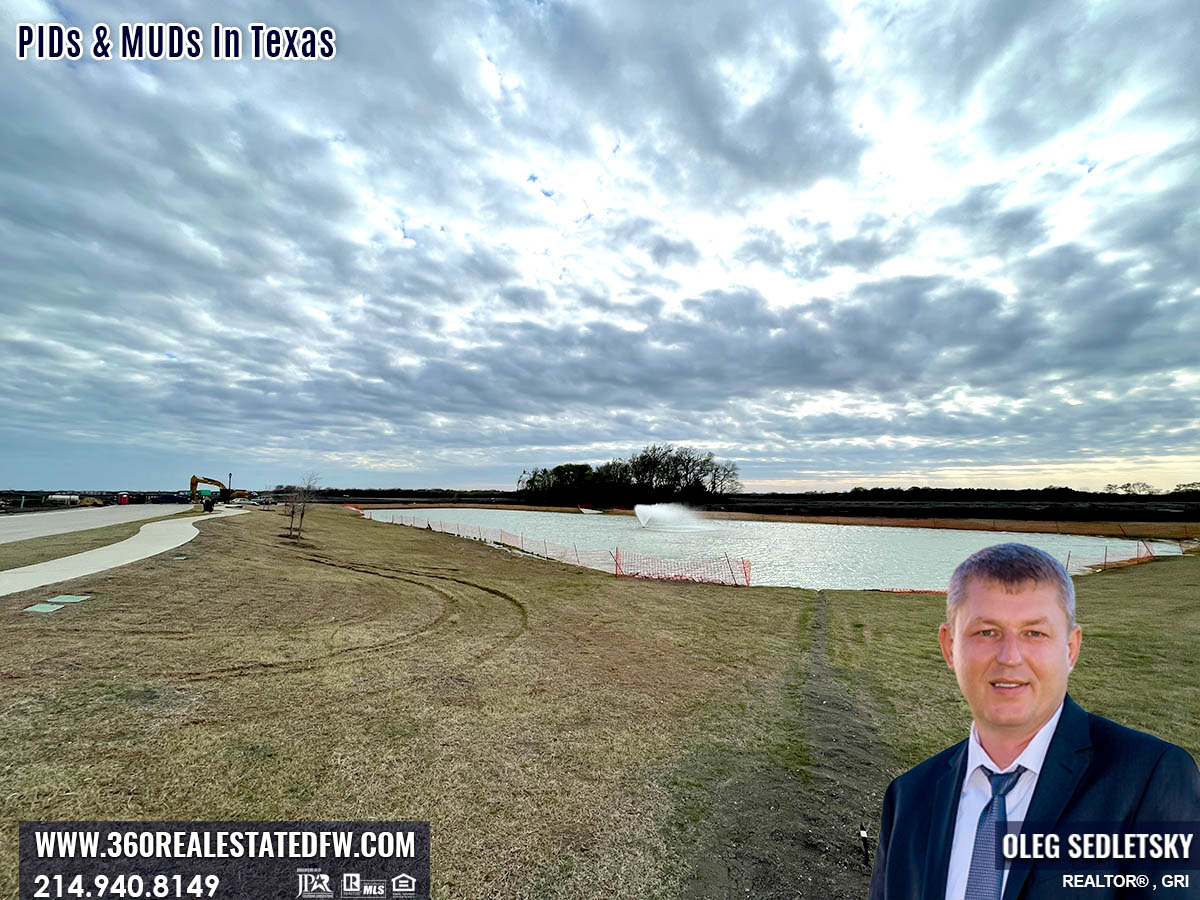
Recreational area with a pond in the PID community in Princeton Texas
How does PID affect homebuyers?
Homebuyers often find themselves considering properties within Planned Improvement Districts (PIDs) due to the excellent amenities and well-developed infrastructure these communities offer. With PID, the costs of infrastructure developments and amenities are spread out, making it more manageable for residents. What sets PID apart from standard taxes is that homebuyers have a clear understanding of when their special assessment payments will come to an end. Instead of an ongoing tax like in MUD, the PID assessments will eventually end, providing a welcome sense of certainty for financially conscious homebuyers. Furthermore, in some real estate market situations, savvy buyers may even negotiate with sellers to pay off the PID assessment, reducing their monthly payments while still enjoying the benefits of living within such a well-planned community.
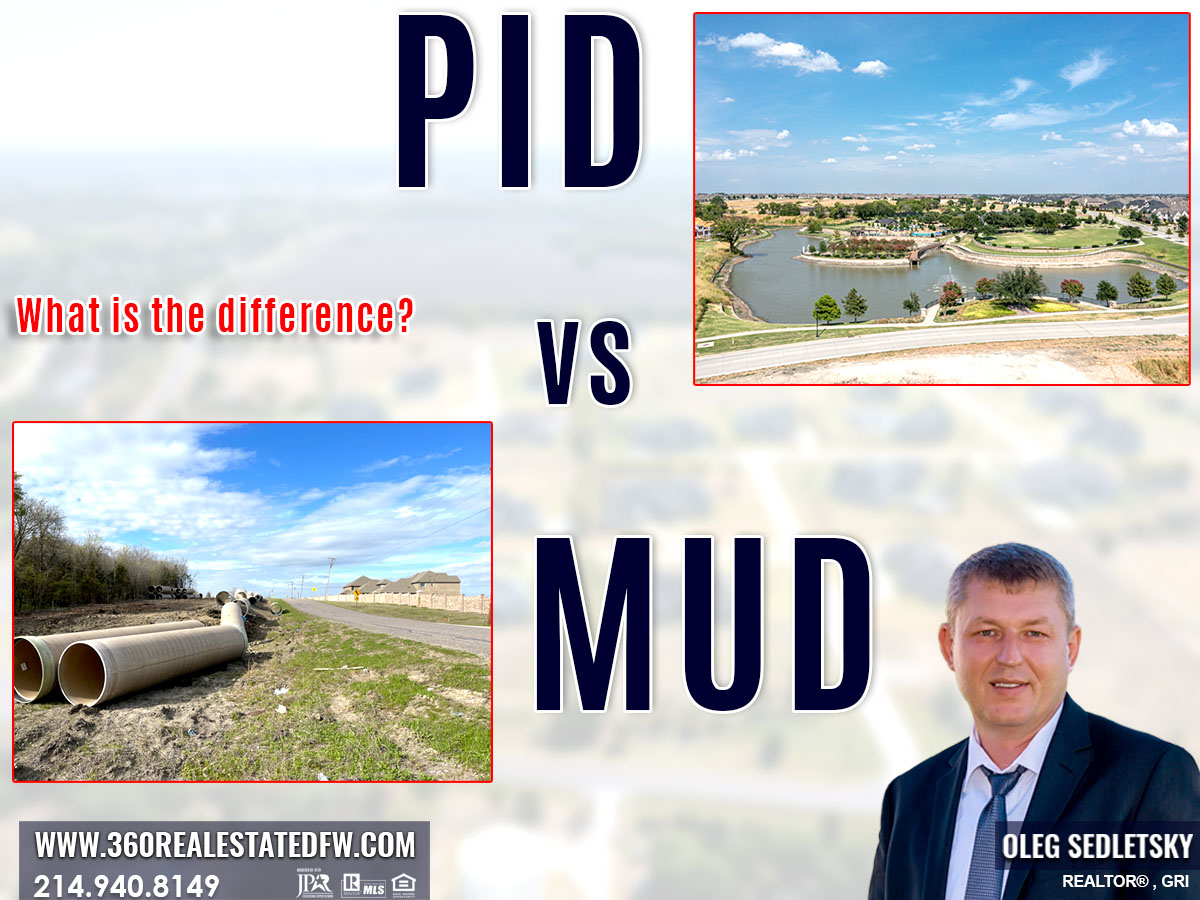
What is the difference between MUD and PID?
Have you ever wondered about the difference between MUD and PID? It’s actually not as complicated as it seems.
While both MUDs and PIDs serve the purpose in providing essential services and infrastructure improvements, they are each managed by different layers of government. MUDs, are run by the state government and operate under their authority. In contrast, PIDs fall under the jurisdiction of local governments, such as individual cities. So, next time you hear about MUDs and PIDs, you’ll know how they differ in terms of governance, though they share a common goal of bettering our communities.
Another important distinction lies in the financial aspect.
MUD is a tax, while the PID is an assessment.
You see, taxes may stick around forever, but assessments have an expiration date – they disappear once they’ve been fully paid off.
So before you find yourself lost in property jargon, remember this is the essence of the MUD and PID difference!

HOW TO FIND MUD or PID IN TEXAS:
As the Dallas-Fort Worth area continues to expand, and new developments crop up, it’s clear that MUDs (Municipal Utility Districts) and PIDs (Public Improvement Districts) are here to stay. These tools help provide the necessary infrastructure for our ever-growing communities, and they’re definitely something to keep in mind when shopping for a home in North Texas. Don’t hesitate to ask your trusted Realtor if your dream property is part of a MUD or PID, as this could affect your overall expenses. To do some research on your own, you can check the Texas Commission of Environmental Quality website for MUD locations, while PID information can be found by searching the local city or town website where the property is situated. Happy house hunting!
HOW TO FIND MUD IN TEXAS:
Texas Commission of Environmental Quality (TCEQ)
https://tceq.maps.arcgis.com/apps/webappviewer/index.html?id=04bbf8b322b34d8abaea7b06996d3775
https://www.tceq.texas.gov/gis/iwudview.html
https://www.tceq.texas.gov/
Chapter 49 https://statutes.capitol.texas.gov/docs/wa/htm/wa.49.htm
HOW TO FIND PID IN TEXAS:
Search PID in **city/town** or call local government
Celina, TX https://www.celina-tx.gov/1243/Public-Improvement-Districts
Frisco, TX https://www.friscotexas.gov/161/Public-Improvement-Districts-PID
Plano, TX https://www.plano.gov/1910/PID-Resources
Princeton, TX https://princetontx.gov/191/Public-Improvement-Districts
Anna, TX https://www.annatexas.gov/1133/Economic-Development
Fate, TX https://www.fatetx.gov/472/MUD-PID-Districts
Are you ready to experience the joy of homeownership in the vibrant Dallas-Fort Worth area?
Whether you’re in search of an existing home or a brand-new construction, rest assured that I’m here to assist you every step of the way.
With a dedicated Realtor by your side, the home-buying process becomes a breeze. Say goodbye to stress, and let me handle all the intricate details on your behalf.
Getting the guidance you need is as simple as filling out a brief questionnaire on my Homebuyers contact form. From there, I’ll take care of everything, ensuring a seamless and hassle-free journey towards finding your dream home.
Call/Text 214.940.8149

The Buyer’s Agent Duty
READ: Texas Real Estate Commission Information About Brokerage Services
AS AGENT FOR BUYER/TENANT: The broker becomes the buyer/tenant’s agent by agreeing to represent the buyer, usually through a
written representation agreement. A buyer’s agent must perform the broker’s minimum duties above and must inform the buyer of any
material information about the property or transaction known by the agent, including information disclosed to the agent by the seller or
seller’s agent.
A BROKER’S MINIMUM DUTIES REQUIRED BY LAW (A client is the person or party that the broker represents):
– Put the interests of the client above all others, including the broker’s own interests;
– Inform the client of any material information about the property or transaction received by the broker;
– Answer the client’s questions and present any offer to or counter–offer from the client; and
– Treat all parties to a real estate transaction honestly and fairly.
TO AVOID DISPUTES, ALL AGREEMENTS BETWEEN YOU AND A BROKER SHOULD BE IN WRITING AND CLEARLY ESTABLISH:
– The broker’s duties and responsibilities to you, and your obligations under the representation agreement.
– Who will pay the broker for services provided to you, when payment will be made and how the payment will be calculated.
TYPES OF REAL ESTATE LICENSE HOLDERS:
– A BROKER is responsible for all brokerage activities, including acts performed by sales agents sponsored by the broker.
– A SALES AGENT must be sponsored by a broker and works with clients on behalf of the broker.
Latest from Dallas Real Estate Blog
– Texas Homebuyers Tips, Tricks and Lifehacks
– New Construction Homes in Dallas TX
– Mortgages for Homebuyers and Investors in Dallas-Fort Worth










